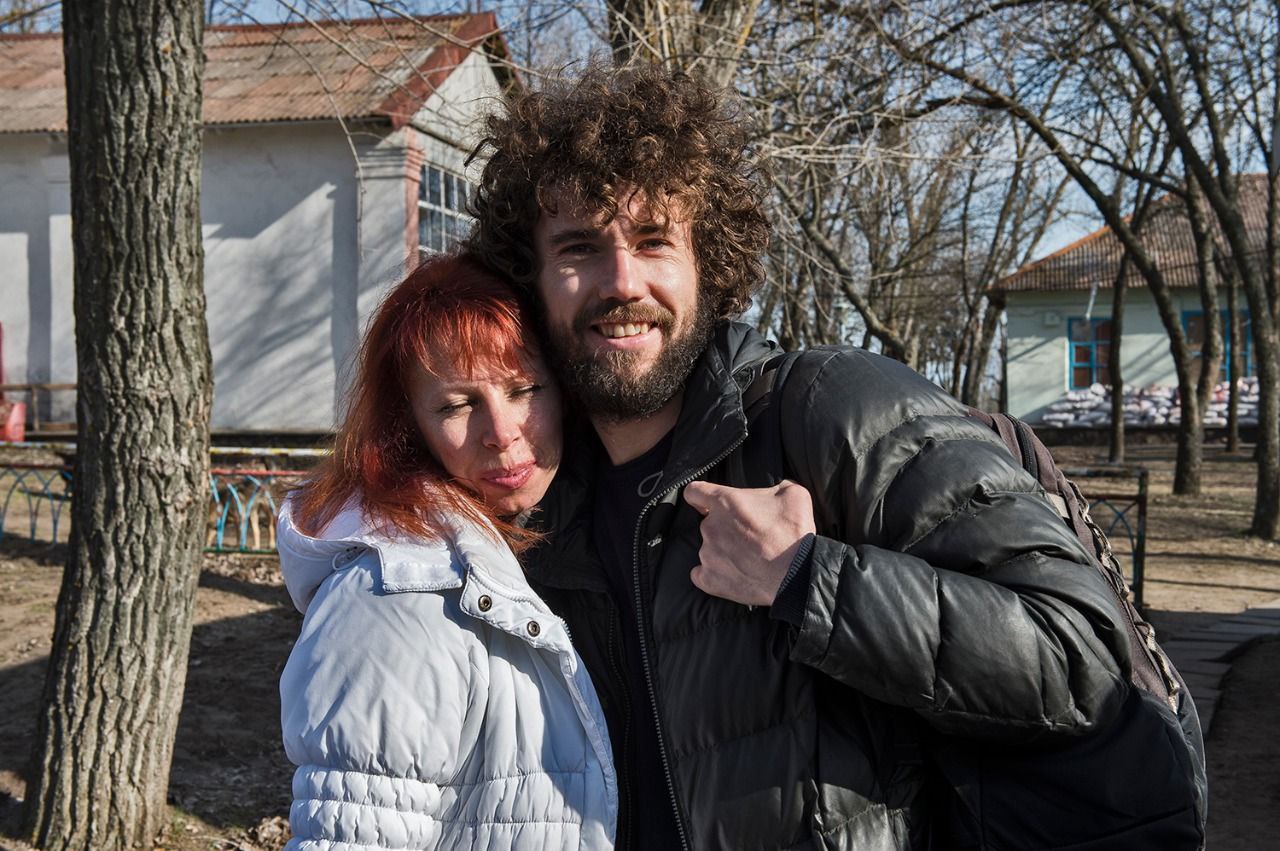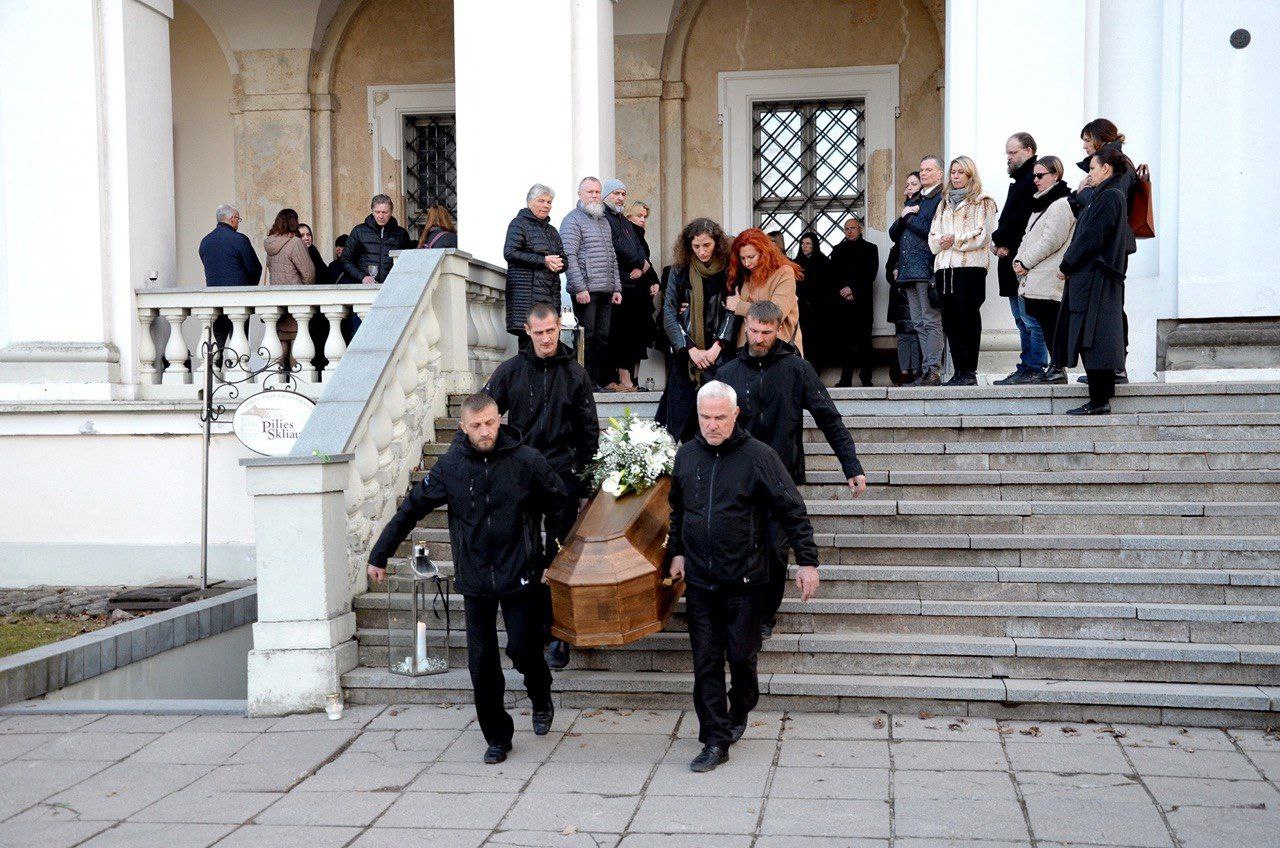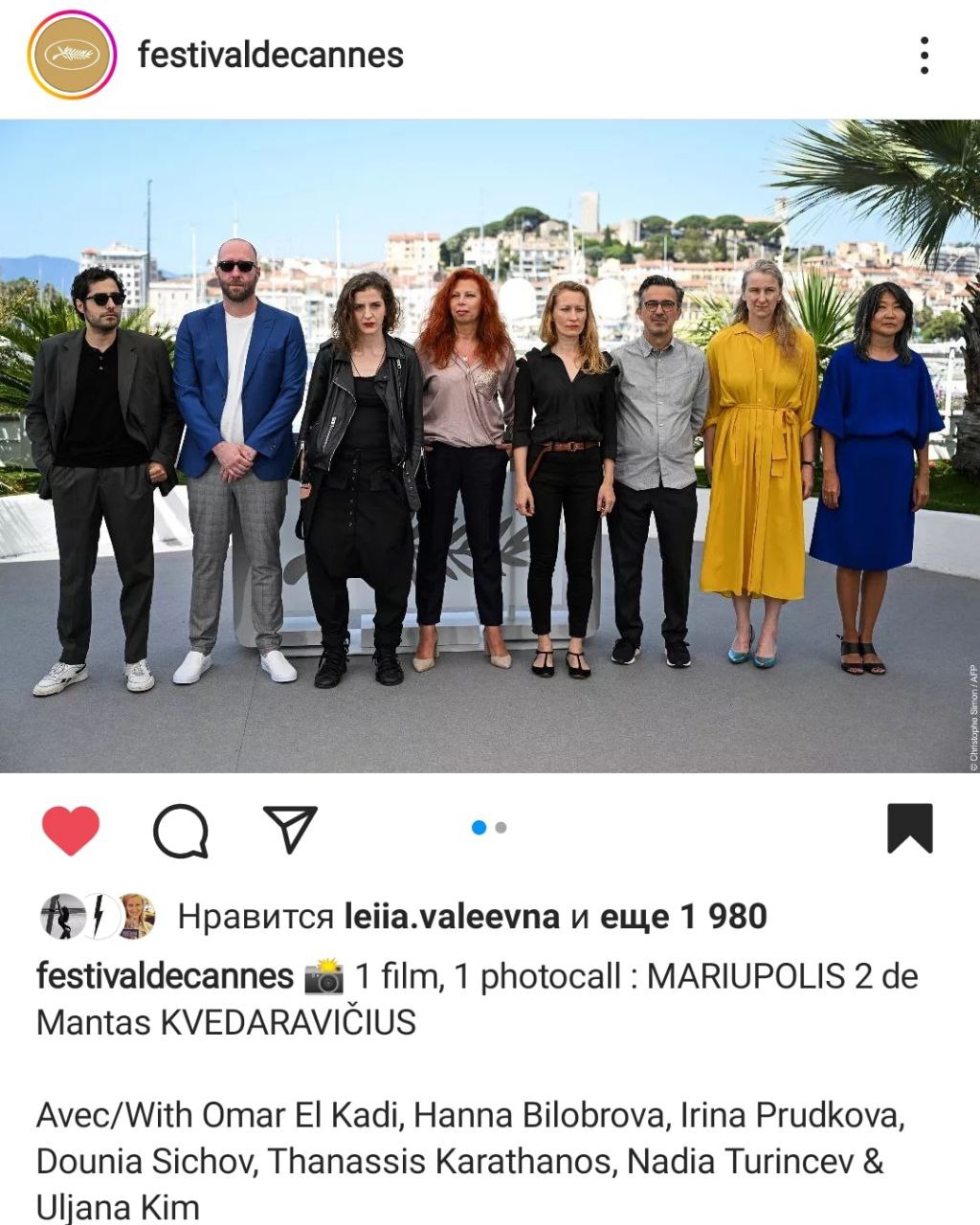The Institute of Mass Information continues to publish wartime stories from regional journalists. In May of this year, Mariupol journalist and producer Iryna Prudkova appeared on the Cannes Film Festival red carpet together with an international team of documentarists.
Sadly, the making of this film cost the director his life; however, it became a tale for the whole world about the tragedy of Mariupol and the russian terror. The Mariupol journalist had been assisting in the filming process the entire time. In her interview, Iryna Prudkova shared the details of this story.
As the new stage of the war began, Mariupol journalists had to flee the city, and those who remained either abandoned their profession or joined the ranks of collaborators. Journalist Iryna Prudkova left Mariupol in the first days of the full-scale invasion. She took her relatives with her and went to Lviv. She only packed her working laptop and a minimum amount of things.
Iryna Prudkova worked at the local TV channel MTB for 12 years; starting from 2014, she had been actively helping the military on the front line, worked at the Right Sector headquarters for several years, arranging communications between foreign journalists and the Right Sector fighters. Now Iryna and her family are settling in their new place in Ternopil, so she took a short break from work. However, she plans to continue her work in cinema, with the archives of Ukrainian documentary films; the Mariupol journalist also continues to help foreign documentarists who reach out to her and plans on finishing her own documentary projects about Mariupol, because, fortunately, Irina managed to take with her the hard drives from her working computer.
Local TV as a starting point
In 2014–2015, local TV saw some considerable changes. In 2015, the TV station where Iryna worked was headed by Andriy Kior. Now he is among the collaborators.
“With the patriotism in 2015, we were allowed a lot, but we were still able to work; however, Kior was being pressured by Koridorov at that time. He was a crisis manager who was sent by Metinvest [owned by oligarch Rinat Akhmetov] to improve the work at MTB. After a story about an OSCE employee where I talked about intelligence leaks to the russian side, Andriy Kior summoned me and said that he was tired of all the calls from displeased parties and that the investigation program, as well as the analytical department itself, were being closed, and I would have to work in the news. They never allowed me to release my material about the intelligence being leaked to the enemy through an OSCE employee, so I decided to leave. I replied that there were enough journalists to film stories about Metinvest giving out flowers and balloons and that I was resigning. On the same day, I wrote the resignation letter, and when I was leaving MTB in an elevator, I got a call from Mantas, a Lithuanian filmmaker who had previously searched for safety gear for working on the front line through me,” says Iryna Prudkova.
Back then, journalists, researchers, sociologists and anthropologists, political scientists and documentary authors, photographers, and reporters would often come to Mariupol.
“Ballistic Vest Iryna”
And so, Iryna Prudkova resigned from the TV channel where she had worked for many years and which by that point, in 2015, was the place for pro-russian colleagues, and joined the film crew of Lithuanian director Mantas Kvedaravicius. In the foreigner’s phone contacts, the Mariupol woman was listed under the nickname “Ballistic Vest Iryna.”
Mariupol fixers, journalists, and media workers were helping their foreign colleagues look for protective gear, locations and characters to film. Mantas offered Iryna to work together, and on the first day, the Lithuanian found himslef in Shyrokyne village, where fierce fighting was going on at the time.
This was the first location for the filming of the “Mariupolis” documentary about Mariupol, which was not occupied at the time, but was already on the front line. Iryna was the official volunteer and information service of the Right Sector, which is now the 8th battalion “Aratta.”
“That’s why I immediately took Mantas there. The idea of the film was centered around the stories of the people living in the Greek village of Sartana, 17 km from Mariupol, and in the front-line Shyrokyne. But later, Mantas got to know my family and decided that my eldest daughter should also be a character in the film, as she had gotten under fire in the Skhidny neighborhood in January 2015, along with other Mariupol residents,” says Iryna Prudkova.
At that time, Mariupol was already in the front pages due to the fierce hostilities on the eastern outskirts of the city, namely because of the Skhidny neighborhood being shelled from russian GRADs. Mantas filmed all the necessary content during the spring and autumn of 2015 and traveled to the Berlin Film Festival to present a movie about the peaceful life of a frontline city. It happened in February 2016 at the Berlinale, in the festival’s prestigious program “Panorama.”
By 2017, the media’s interest in Mariupol had gradually waned, and the war entered a stalemate. But at the end of 2021, everything changed again. With the action on the front line intensifying and the equipment being moved towards the border, foreign mass media went to Mariupol again; journalists were “preparing” for war, checking information, trying to get to the front line.
From a journalist to a producer
Preparing for the filming of a documentary is not a one-day affair, especially if the filming location is a city under siege with a completely destroyed infrastructure, a city that has been living without water, gas, or electricity since February, with mass graves in backyards and approximately up to 100,000 civilians and military personnel killed, according to unofficial data. Iryna helped Mantas get into the blockaded Mariupol in March 2022.
“He really became family to us. It was him who helped us evacuate from Mariupol in the first days of the full-scale invasion in February 2022. But when he said that he would go to Mariupol in March 2022, I said that he was out of his mind,” the Mariupol journalist recalls the beginning of the work on the second “Mariupolis.”
“What should we call it? Let’s call it the Big War”
For the people of Mariupol, the war began in 2014. It was loud, frightening, but bearable. However, on February 24, 2022, the russian invaders started a new phase of the war. In Mariupol, hostilities resumed with terrifying intensity. And not only on its eastern outskirts, but also in the center and throughout the city. In addition to constant bombings, air raids and attacks from the sea, the threat of a blockade, which later turned into an occupation, was growing in Mariupol day by day. Mariupol journalists have especially been under threat since the beginning of active hostilities in the city.
“I was ready to leave Mariupol and depart on that same day. Because I knew that it was very dangerous for me to stay in Mariupol. I have been in the “DPR Tribunal Database” since 2014, on the FSB blacklists since 2015, in the “Luhansk Checkpoint” since 2016, and from the very beginning of the war, the Kadyrovites had been keeping me on their radar,” says the journalist and army volunteer. This meant that any meeting with the russian military or with the so-called “DPR” proxies could have resulted in capture or even death for the Ukrainian journalist.
“I was working with the military, and they would report all this to me. As for the FSB, my cousin, a russian, ratted me out to this department. And we made an entire video about ‘the Kadyrovites’ back in 2016: an address from the Sheikh Mansur battalion, which at that time was small in numbers, but was defending Mariupol nonetheless. I took part in the development of this video. So the Kadyrovites did come to my house, though it happened when we were gone already,” says Iryna Prudkova.
In 2022, Kadyrov’s fighters had been to the journalist’s apartment in Mariupol.
“I definitely wasn’t going to return to Mariupol. And when Mantas called me and said that he and Anna had decided to go to Mariupol and film the second part of the documentary, because ‘this is a completely different war,’ I was mad, but I agreed to do everything possible to get him there. My family and I made up a legend for him: that he was going to the city with a humanitarian mission. We filled my nephew’s minibus with humanitarian aid in Poland and gave Mantas a list of people who needed it,” says the journalist.

Mantas and Anna on the day of their departure to Mariupol, March 2022
As Iryna says, they were bringing medicine, portable stoves, flashlights, warm blankets, and food to Mariupol. While working on the film back in 2015, the Lithuanian director had made some real friends in the seaside city. Therefore, the purpose of the trip was not only to film, but also to bring aid directly to the besieged Mariupol.
“They got to a Baptist church in whose basement people were living and hiding. For a while, we managed to keep in touch with them. There was a guy named Maks who lived in that church, and whenever he could he would go with a phone to a place where it could pick up the signal. From him I learned that Mantas and Anya had filmed all the material and were going to evacuate together with the volunteers who had come to the church. However, before that, they wanted to visit all the people from the list we provided,” she recalls.
Then Mantas and his friend Anna went out of touch, and later Maksym sent a message from the church that Mantas had been detained.

Mantas Kvedaravicius’ funeral, April 2022
Red carpet, black clothes
In May 2022, the international film crew of “Mariupolis-2” attended the red carpet of the annual Cannes Film Festival in black mourning clothes, and without their director. Mantas had died in Mariupol.
The filmmaker was captured by russian terrorists as he and Anna were about to evacuate. They did not have time to leave the blockaded and occupied Mariupol. Mantas was tortured and brutally killed, and his body was thrown out under mortar fire.
“Anya looked for him around the city, went to russian commanders and collected any information she could. Most likely, Mantas’ body was ‘thrown’ her way so that she would not think that he had been tortured and killed deliberately,” Iryna Prudkova says.

The international film crew of Mariupolis, Cannes Film Festival
Anna Bilobrova, the filmmaker’s close friend, colleague, and companion in Mariupol, was able to recover not only her dead friend’s body, but also their work – the video content for the film. Anna continued to work on the recording. The film was edited in three weeks in order to be submitted to the Cannes Film Festival on time. It was extremely important to show the film right now, during the invasion.
After all, the footage included in the film became video evidence of the mass murder of the city’s almost half a million population. It became evidence of the mass death of Mariupol civilians, killed by terrible shelling, buried under the rubble of the buildings bombed from the air, as well as those who had died of hunger, cold, and despair.
“People in the theatre were crying. Some couldn’t stand it and left. We got a standing ovation, and those who came up to express their support asked us, ‘Why are you so sad?’ And I really want this film to be presented at international trials, in particular, in The Hague. We will fight for the case of Mantas’ murder to be broight to The Hague or some other international court. And I really want Mariupolis-2″to be released internationally.”
***
In May 2022, the film by the Lithuanian director Mantas Kvedaravicius won the Golden Eye Special Jury Prize at the Cannes Film Festival. The jury commented on their decision as follows: “Our special prize goes to a film that cannot be compared with any other from the competition. A very radical, bold, artistic, and existential statement – “Mariupolis-2.” Director Mantas Kvedaravicius is one of the thousands of civilians killed by the russian army since the beginning of putin’s full-scale invasion.”
Yulia Harkusha, regional representative of the Institute of Mass Information in Donetsk oblast